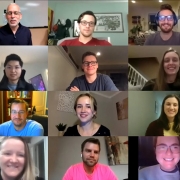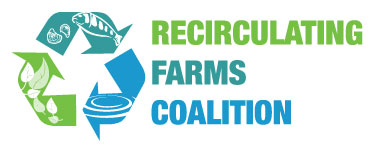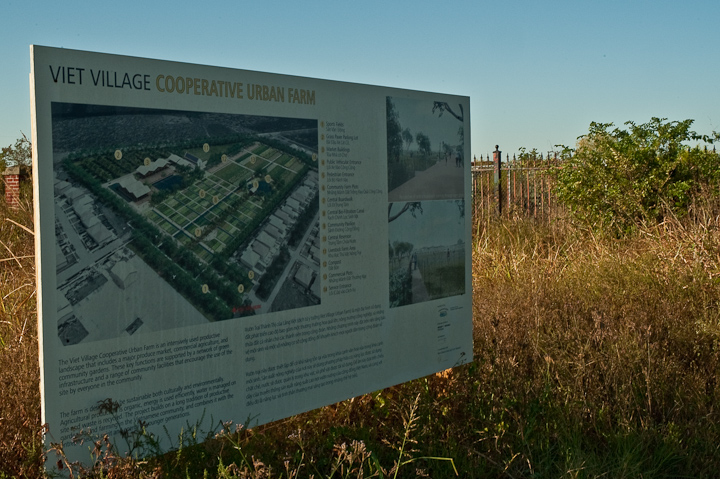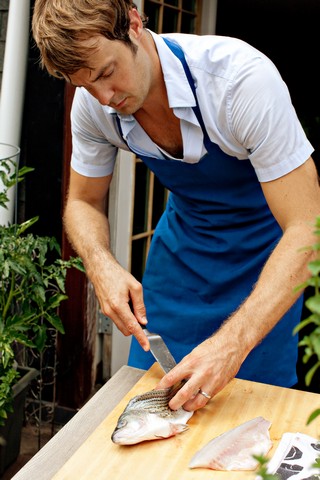Sustainable Salmon Farming: New Developments and Promise for British Columbia

First Nations' totem art in British Columbia depicting a man with salmon. Representatives from the Canadian First Nations participated in the Vancouver workshop toward the goal of developing a more sustainable salmon industry for the region.
Serious environmental problems from traditional forms of marine finfish aquaculture — especially salmon aquaculture — are well-documented. The use of “net pens” in coastal areas around the world have resulted in local pollution, spread of disease and parasites, and escapement of non-native species. These problems are especially evident in the fjords of British Columbia where dozens of large-scale Atlantic Salmon farms have led to public outcry following the publication of peer-reviewed scientific papers demonstrating that nearby wild salmon populations are becoming infected with “sea lice,” (small parasitic crustaceans) from the captive salmon.
On April 26 and 27, 2010, Simon Fraser University’s Centre for Coastal Studies partnered with Tides Canada and the SOS Marine Conservation Foundation to host a workshop to explore the viability of land-based closed-containment recirculating aquaculture systems (RAS). Over 60 participants from industry, government, investors, academia, First Nations, and environmental and conservation foundations (including 1planet1ocean, long an advocate for RAS or “next-generation” aquaculture systems) came together to examine the current status closed-containment aquaculture, discuss potential barriers to creating this new growth industry in British Columbia (B.C.) and develop an action plan to aid in moving this industry forward. There is now consensus that it is time to explore this technology further as a mechanism to establish B.C. as a leader in creating a globally renowned, stable and viable aquaculture industry. Already, major Canada food retailer Overwaitea, a participant in the workshop, is sourcing salmon from a small closed-containment system for Coho Salmon in Washington State and indicated during the workshop that it would purchase much more if there were a supply.
A report just released by Canada’s SOS Marine Conservation Foundation concludes that land-based, closed-containment RAS for growing salmon in B.C. would be profitable and could sustain an aquaculture industry that is both sustainable and profitable. RAS systems recirculate their water and have no contact with natural water bodies or wild fish populations and therefore do not create problems of disease, parasites (sea lice) or escapement typical of traditional in-water net pen fish farming. The report demonstrates that closed containment systems can be made even more profitable by growing hydroponic vegetables using excess nitrogen waste from the fish.
On June 7, 2010, Tides Canada, in collaboration with Simon Fraser University’s Centre for Coastal Studies, will be hosting an invitation-only educational workshop (see details below) designed for socially responsible investors to learn more about the technical and economic feasibility of land-based closed-containment salmon aquaculture, the opportunities and challenges, and the initiatives underway to demonstrate this new technology. In addition, input from the investment community is sought to better identify what is required to bring investors together to move this industry forward at a commercial scale.
Learn More:
SOS Marine Conservation Foundation Report: Technologies for Viable Salmon Aquaculture – An Examination of Land-Based Closed Containment Aquaculture by Dr. Andrew S. Wright
Vancouver Sun: Fish Farms Should Be On Land
CBC Radio (Audio) : Dr. Andrew Wright interviewed on BC Almanac (12 May 2010)
Next-Generation Aquaculture: The Future of Fishing on Planet Earth
|
Podcast: Play in new window | Download







We are a group of volunteers and opening a new scheme in our community.
Your web site offered us with valuable info to
work on. You have done a formidable job and our entire community will be grateful to you.